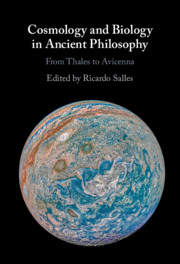Book contents
- Cosmology and Biology in Ancient Philosophy
- Cosmology and Biology in Ancient Philosophy
- Copyright page
- Contents
- Contributors
- Acknowledgements
- Introduction The Intersection of Biology and Cosmology in Ancient Philosophy
- Chapter 1 Souls and Cosmos before Plato
- Chapter 2 The Ensouled Cosmos in Plato’s Timaeus
- Chapter 3 Platonic ‘Desmology’ and the Body of the World Animal (Tim. 30c–34a)
- Chapter 4 The World Soul Takes Command
- Chapter 5 Begotten and Made
- Chapter 6 The De Motu Animalium on the Movement of the Heavens
- Chapter 7 Biology and Cosmology in Aristotle
- Chapter 8 Recapitulation Theory and Transcendental Morphology in Antiquity
- Chapter 9 The Stoics’ Empiricist Model of Divine Thought
- Chapter 10 Why Is the Cosmos Intelligent?
- Chapter 11 Cardiology and Cosmology in Post-Chrysippean Stoicism
- Chapter 12 The Agency of the World
- Chapter 13 God and the Material World
- Chapter 14 At the Intersection of Cosmology and Biology
- Chapter 15 Is the Heaven an Animal?
- References
- Index
- Index Locorum
Chapter 8 - Recapitulation Theory and Transcendental Morphology in Antiquity
Published online by Cambridge University Press: 21 May 2021
- Cosmology and Biology in Ancient Philosophy
- Cosmology and Biology in Ancient Philosophy
- Copyright page
- Contents
- Contributors
- Acknowledgements
- Introduction The Intersection of Biology and Cosmology in Ancient Philosophy
- Chapter 1 Souls and Cosmos before Plato
- Chapter 2 The Ensouled Cosmos in Plato’s Timaeus
- Chapter 3 Platonic ‘Desmology’ and the Body of the World Animal (Tim. 30c–34a)
- Chapter 4 The World Soul Takes Command
- Chapter 5 Begotten and Made
- Chapter 6 The De Motu Animalium on the Movement of the Heavens
- Chapter 7 Biology and Cosmology in Aristotle
- Chapter 8 Recapitulation Theory and Transcendental Morphology in Antiquity
- Chapter 9 The Stoics’ Empiricist Model of Divine Thought
- Chapter 10 Why Is the Cosmos Intelligent?
- Chapter 11 Cardiology and Cosmology in Post-Chrysippean Stoicism
- Chapter 12 The Agency of the World
- Chapter 13 God and the Material World
- Chapter 14 At the Intersection of Cosmology and Biology
- Chapter 15 Is the Heaven an Animal?
- References
- Index
- Index Locorum
Summary
The theory of recapitulation is best known in its evolutionary form, as it was this form that Ernst Haeckel captured with his famous biogenetisches Grundgesetz (‘ontogeny is nothing other than a succinct recapitulation of phylogeny’). It is a theory that is justifiably associated above all with the natural philosophy of the eighteenth to twentieth centuries. Yet some historians of science have raised questions about its roots in ancient thought, and this chapter aims to explore a selection of natural philosophers in antiquity (especially Empedocles, Aristotle, Plato and Plotinus) in order to determine how close they came to recapitulation theory. Certain Presocratic thinkers appear to have anticipated recapitulation theory in some evolutionary sense, but it is no longer to be found in Aristotle and the Platonic tradition. This is not simply because Aristotle and Plato rejected evolution, since there are also non-evolutionary versions of recapitulation which are founded upon hierarchical theories of transcendental morphology. It is shown that only the Neoplatonists can be credited with a clear commitment to transcendental morphology but that even they develop their transcendental morphology in a way that does not lend itself to recapitulation theory.
- Type
- Chapter
- Information
- Cosmology and Biology in Ancient PhilosophyFrom Thales to Avicenna, pp. 131 - 151Publisher: Cambridge University PressPrint publication year: 2021

